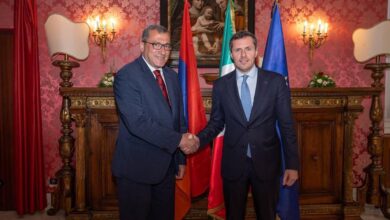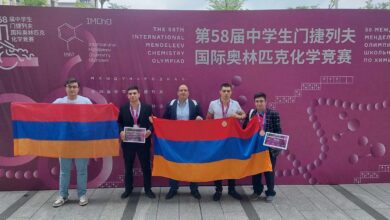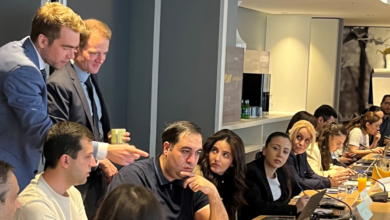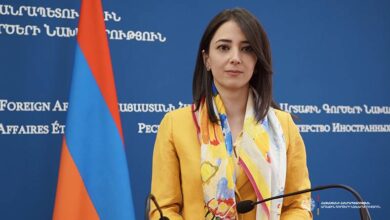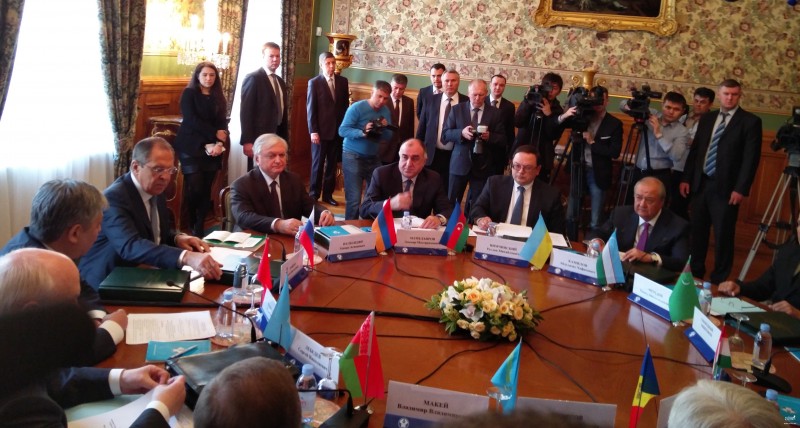
On April 8, Foreign Minister Edward Nalbandian participated in the session of the CIS’ Council of Ministers of Foreign Affairs in Moscow.
The Foreign Ministers discussed the CIS activity and range of issues to improve its efficiency.
Foreign Minister of Armenia delivered a statement at the session. Touching upon the military actions unleashed by Azerbaijan against Artsakh (Nagorno-Karabakh), Edward Nalbandian, said, “From the years of establishment, the Commonwealth of Independent States set forth its role in economic, cultural-scientific, political and other processes, however, not always living up to the expectations. Prevention of negative expressions has not been achieved on a range of fundamental issues, including in security. The Nagorno-Karabakh issue is one of the vivid expressions. Not only have the developments happening in recent days caused human losses and deterioration of the crisis, not only are they fraught with long-term destabilization, but also they may become a new challenge to the International as well as humanitarian law, not only to the United Nations’ Charter, other fundamental documents, but also the CIS Charter, which also contains articles on peaceful settlement of disputes and conflicts.
What happened is a consequence of the fact that not everyone in the CIS in practice shares this approach. Large-scale military offensive unleashed by Azerbaijan in the recent days against Nagorno-Karabakh not only violates the 1994 permanent Trilateral Ceasefire Agreement and 1995 Agreement on the Consolidation of the Cease-fire Regime. By the way, the former was initiated in the CIS Inter-Parliamentary Assembly. From the early hours of the unleashed attack, civilian infrastructures were intentionally and overtly targeted, civilians suffered, including children and the elderly.
The calls of the international community for the settlement of the issue through peaceful means were grossly neglected. It is obvious that all this seriously damages the negotiation process and the efforts of the Minsk Group Co-Chairs.
On numerous occasions we have drawn the attention of the international community urging to curb Baku’s military ambitions having in mind exactly such a development of the situation.
Today more than ever the imperative is in the efforts for finding of solutions to exclude in the future of reoccurrence of what happened, to refuse from undertaking explosive attempts on seeking military solution to the issue, to secure exclusively peaceful settlement of the issue.”
Reflecting on possible reforms and increase of the Organization’s efficiency, Minister Nalbandian said, “We would like everyone in the CIS to realize to the same extent their responsibility for preservation and future of this space. Improvement of the CIS activity would certainly contribute to that. It is important to determine what a CIS we would like to see. Multi-lateral structure is attractive when it is effective with distinct mutual commitments, clear preferences and non-exaggerated structure of sectoral cooperation, duplicating each other on a number of issues.
From our point of view, the decisions on deepening of cooperation in this or that field are worthwhile taking, given the level of real interest of the member-states. I would like to emphasize, real rather than declarative readiness to cooperate via CIS’s resources. Today we face a situation when certain member-state signs only 10 percent of the documents adopted, 90 percent of which with reservations.
With only a few members expressing an interest in cooperation in this or that area, who at the same time are members of other integration and other associations, submission of an issue in the CIS format requires thorough examination. Simultaneously, this approach could not lead to curtailing of cooperation in the mentioned fields within the existing legal framework.
It is reasonable to continue making an inventory on the legal framework, defining clear mechanisms for the implementation of the following principles:
-mandatory rotation of quota positions,
-level of responsibility and accountability of CIS’ structures and bodies for drafting of documents, which enables reduction of a number of meetings with participation of experts from capitals,
-optimization of rule-making activity,
-exclusion of duplication of similar functions, etc.
Yet again I would like to underline, that Armenia pursues a positive agenda in the CIS. We spare no effort to translate into practical life all the positive experience gained within this format of cooperation and provide modernization of CIS in accordance with today’s realities.
Concluding my remarks, I would mention readiness to support drafts of more than dozen documents on different aspects of cooperation agreed upon for the session.”


